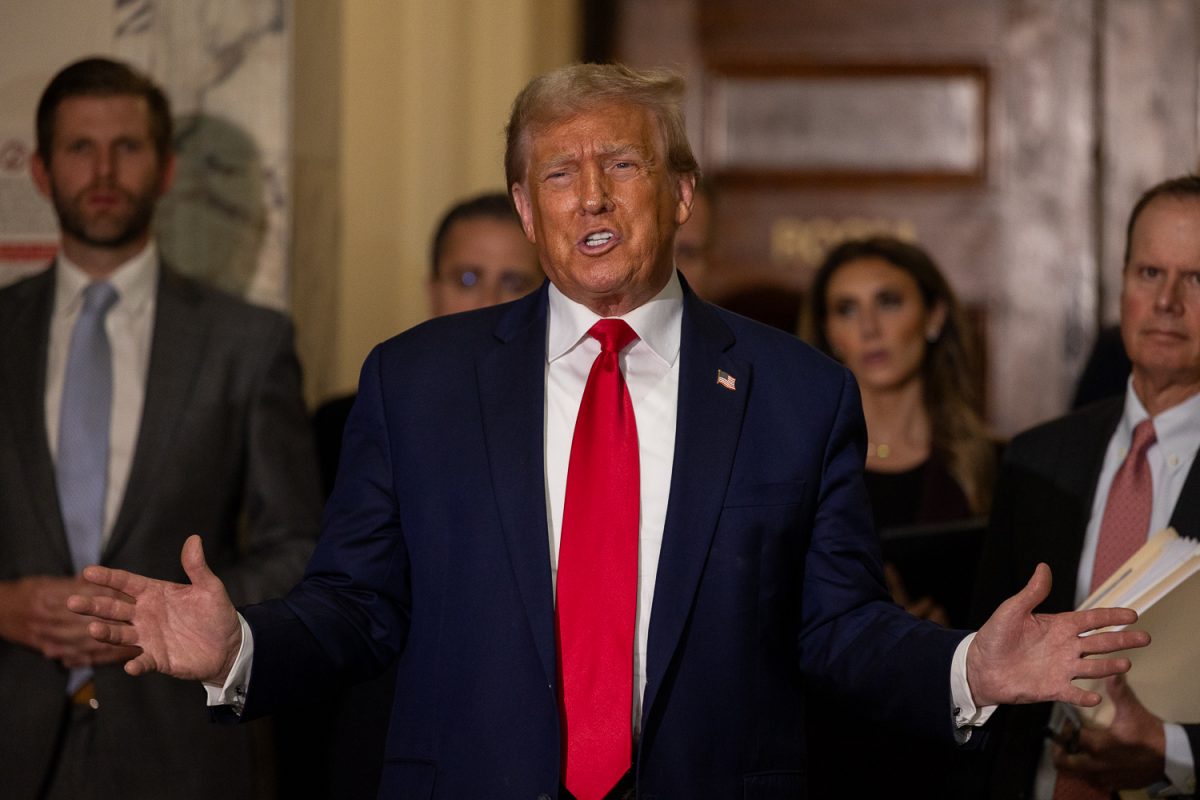Three months into the second Trump administration, Americans are already experiencing crisis fatigue. With every news cycle exposing extreme situations, attacks on democratic norms and controversies, it has become impossible to create meaningful accountability. This is certainly no accident: This relentlessness is a calculated strategy meant to work to President Donald Trump’s advantage by exhausting and overwhelming the public, particularly marginalized communities, in an attempt to paralyze the people with political disillusionment. This tactic, referred to as “shock and awe,” is based on a wartime strategy involving rapid and extreme force to demoralize and intimidate a population into submission. Rather than being used as a tactic in overseas warfare, Trump’s use of executive orders has been to sow chas and fear in order to achieve his political objectives and weaken any opposition.
Since Trump’s inauguration, he has passed over 100 executive orders and subsequently created various legal battles and constitutional crises. The results of these executive orders have been quite drastic, from levying tariffs against all foreign countries to the detainment of student activists from colleges just last week. This, in addition to massive layoffs at federal organizations and the dismantling of governmental institutions, has made the current state of our country unprecedentedly unstable, with many scared for the safety of themselves and their loved ones.
Trump is not only manufacturing an entirely new mental health crisis but simultaneously hindering and defunding the resources that currently exist for people to utilize. According to a study conducted by the American Psychological Association in 2023, 72% of Americans cited the state of the country as a cause of their stress. Just this week, the Department of Health and Human Services cancelled over $12 billion in federal grants to states that tracked health services such as mental health initiatives. Millions of Americans are dependent on mental health services that provide therapy, medication and crisis intervention services. These cuts will disproportionately harm marginalized communities that already face systemic barriers to accessible care. Trump’s federal cuts to the health sector are detrimental to specific groups within the American public.
Trump’s recent retaliation against diversity, equity and inclusion programs also add a new barrier to people of color in the United States. Mental health services, which were already difficult to obtain for marginalized groups in America, have only been exacerbated due to Trump’s push to cut funding.
One day after Trump’s inauguration in January, The Trevor Project — one of the most well known suicide prevention organizations for LGBTQ+ communities across the country — witnessed a 700% increase in usage of crisis lines. This is due to LGBTQ+ rights being hindered under Trump’s new administration, such as removing content from federal agency websites like the U.S. Department of Education. In addition to Trump’s oppression of LGBTQ+ and Black Americans, Trump has incited Islamophobic rhetoric and policies against Arabs and Muslims as well as the Latino community.
Now more than ever, mental health amongst Americans will only decline. The psychological toll of living under Trump is well documented. Therapists have even coined the term “Trump Anxiety Disorder,” to reflect the public’s increased levels of stress and depression during his last term, seen in many young people, immigrants and people of color.
In a report by NBC News, federal workers have described having “overwhelming stress, personal crises, suicidal ideation, rapid weight loss, prolonged lack of sleep, panic attacks and visiting the emergency room after a mental breakdown.”
Prolonged exposure to distressing news, whether it be through doomscrolling or regular news consumption, leads to heightened anxiety. Those frequently engaging with distressing content are more likely to become desensitized and disengaged. There are ways to protect your mental health without disengaging — staying informed is necessary, but endless reading about political turmoil can be debilitating. As gloomy as it all is, taking a few hours away from your phone or social media can progressively take a weight off your mental stress. Setting a designated time to check in on particular issues can help deter you from feeling trapped in a cycle.
It is also essential to do restorative activities. Whether that is spending time with loved ones, reading a book, exercising or taking on a new hobby, finding moments of relief can provide necessary mental escapes. These practices are not a sign of disengagement but rather an essential part to preserving the energy and mental stability needed to resist political injustice.
Finding spaces to process your emotions and share your experiences can help to counteract the isolation that so many of us feel under this presidency. Find a community that shares your interests or that you feel comfortable sharing your feelings with. Despite mental health awareness groups potentially being impacted under Trump’s second presidency, there are outlets in the city, such as Venture House’s Clubhouse, that are dedicated to providing support.
Though Trump’s shock and awe strategy has done lasting damage to the population’s psyche, disengaging entirely is not an option. Safeguarding our well-being is vitally important to sustaining resistance and not succumbing to exhaustion so we can fight for our future. Trump’s crackdown on our essential rights as Americans can lead to feeling confused and isolated, but we must remember that we are not alone.
WSN’s Opinion section strives to publish ideas worth discussing. The views presented in the Opinion section are solely the views of the writer.
Contact Leila Olukoga at [email protected].























































































































































